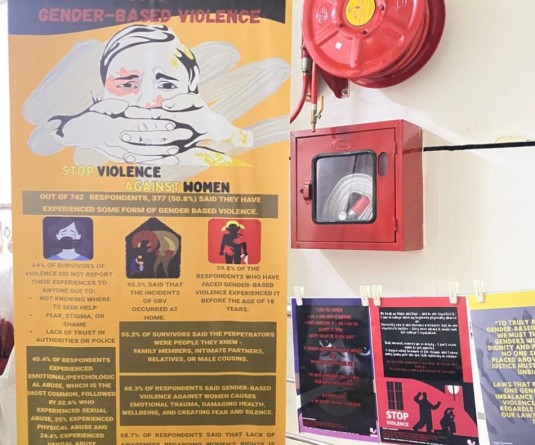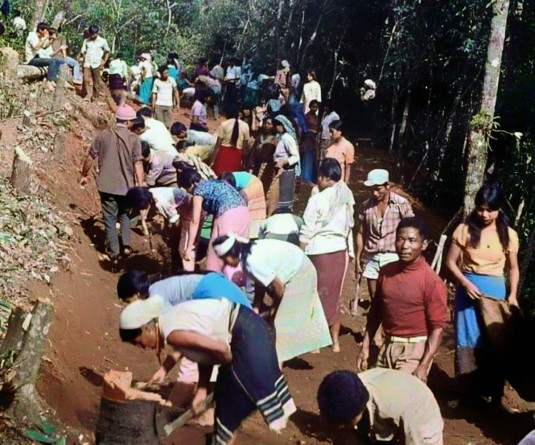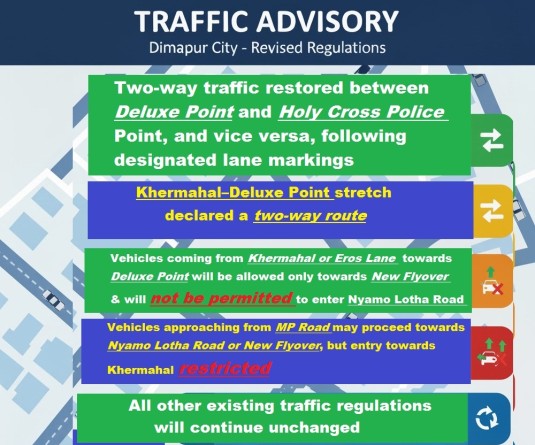Rev Chingmak Chang addressing the Morung Lecture on ‘A people’s approach to development’ at Elim Conference hall, DABA, Dimapur on February 3. (Morung Photo)
Individual transformation, ownership of the process, engaging the community and transparency - the way to success of communitisation, asserts Rev Chingmak Chang
Morung Express News
Dimapur | February 3
‘More governance and less of government’ should be the approach of the Nagaland State government to improve the delivery mechanism at the grass root level, Rev Chingmak Chang, founder of the Eleutheros Christian Society (ECS) underscored on Wednesday.
Addressing the Morung Lecture series on the issue, “A people’s approach to development” at Elim Conference Hall, DABA Dimapur, Rev Chingmak explained that service providers need to invest more time with the community and mobilize them for action, facilitating a bottom up approach. This can be done by following the model of ‘plan together, act together and evaluate together.’
In this, he felt that the Nagaland Communitisation Act 2002, which was enacted as a paradigm change of the government to be in an assistive, monitoring and regulatory role, had not invested much on community development but rather took it as a development issue.
The process of communitisation areas like education, health, power, etc and has been often been portrayed as a success story by the State government and even winning a coveted United Nations Award for Public Service. However, there are also reports on how communitisation in the State has failed to meet set expectations.
Rev Chingmak observed that the act may have failed because of lack of transparency and most crucially, the community lacked ‘ownership’ of the process of communitisation. He said dependency was crippling the creativity of the people.
Not a new concept for Rev Chingmak and wife Phutoli, who through ECS, set up a Primary Health Centre (PHC) at Longpang, initially focusing on drugs and HIV/AIDS intervention through community ownership and on the premise of helping the community to help themselves.
Their attempt to encourage people to take ownership in the early years was what inspired the then Chief Secretary of Nagaland to RS Pandey to observe ECS activities and anchor the Communitisation of Public Institutions and Service Act 2002 for the state of Nagaland.
The principle of ECS was to introduce less-engaged members of society to the concept of civil society to promote democratization, civic participation, and government accountability.
Highlighting on how a cluster of village councils in Tuensang district got together in a critical story of change to define health in their terms in 2008, Rev Chingmak said the success of this ECS initiative titled ‘Weave a Dream’ largely lay on “individual transformation, ownership, handholding and transparency.”
“It was about spending more time engaging with the community, convincing them, creating awareness, partnering and planning. The implementation part by the community was only 40% of the task,” Rev Chingmak emphasized. The ECS founder said the communitisation is something that the Nagas can hold on to; just that it is not abused. “There are many loopholes within the act. Policymakers should reevaluate the act,” he said.
Since its inception in 1992, ECS has paved novel ways in initiating a number of ingenious programmes on school education, women’s rights and livelihood generation through involvement of all constituents of the community. “And that’s the beauty of working with the community-they would enthusiastically take up other issues to tackle like they did with the health issue,” Rev Chingmak pointed out.
The lecture sparked a number of pertinent and interesting queries from the participants- on role of the church in development and peacekeeping, transparency or lack of it on the part of policymakers. Or whether the community programmes initiated by ECS in Tuensang can be replicated in urban areas like Dimapur or Kohima.
A retired State government official from DUDA during discussion hour said lack of transparency encouraged corruption while citing an instance of how the State government tends to be secretive about work programmes and tenders, when it should actually be put in public domain.
Dr Akum Longchari, Chief Editor of The Morung Express in his concluding remark said personal transformation along with trust and ownership should be the key to development. Also stressing on human development, Dr Longchari felt that development should foremost be about building people.
He informed that the Morung Lectures organized by the Morung for Indigenous Affairs and JustPeace and The Morung Express is an initiative to create critical consciousness and to facilitate space for learning. Today’s lecture by Rev. Chang is the second in the series.






